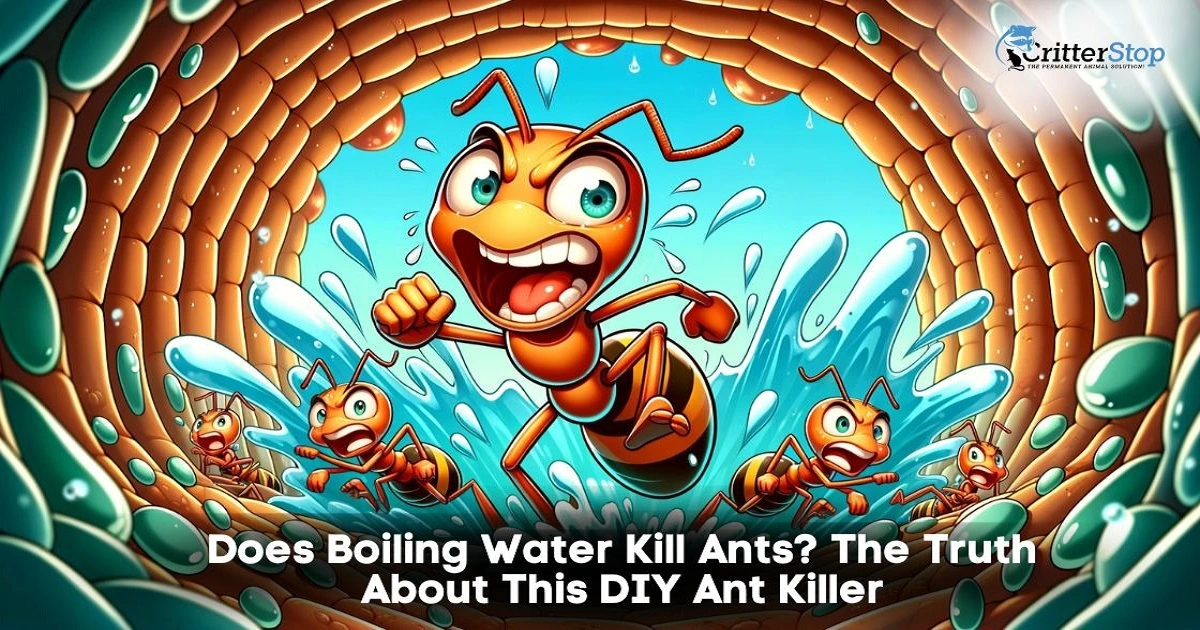
Boiling water is a common household remedy for getting rid of unwanted pests, including ants. But the question remains: does boiling water kill ants? The answer is yes, boiling water can be an effective method for killing ants, but there are some important factors to consider.
When boiling water is poured directly onto an ant nest, it can kill many ants and damage the nest's structure. However, it may not effectively kill all the ants, especially if the nest is deep underground. In addition, pouring boiling water onto a nest can be dangerous and should be done cautiously to avoid burns or injury.
Please note that boiling water should not be used to control ant infestations. Ants are resilient creatures and may relocate their nests if they feel threatened. Therefore, using a combination of methods, such as bait stations and insecticide sprays, is recommended to eliminate ant colonies effectively.
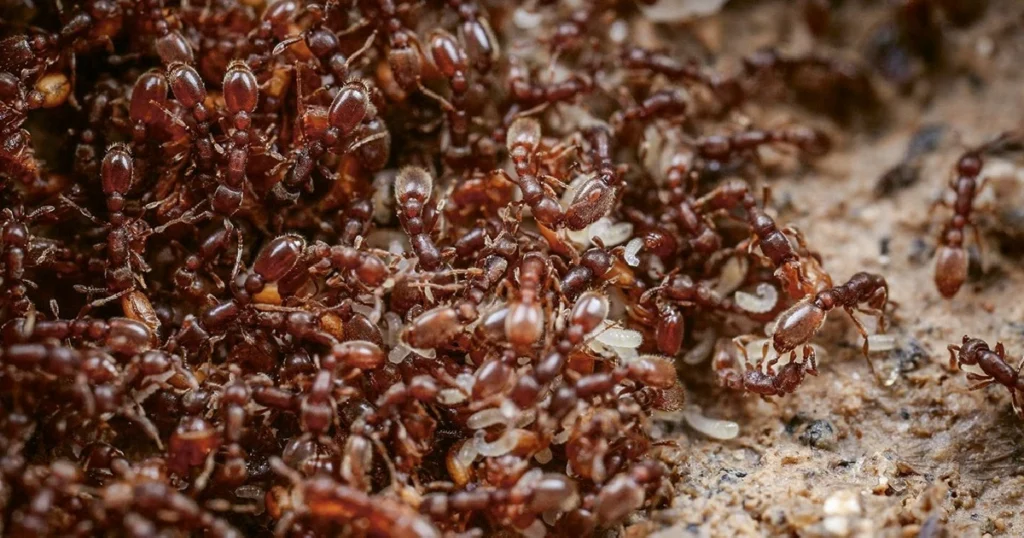
Ants are household pests that are difficult to eliminate. One popular ant control method is to pour boiling water on ant colonies. But does boiling water kill ants? This section will explore the science behind boiling water and ants.
When boiling water is poured into an ant colony, the heat energy is transferred to the ants and their environment. The high temperature causes the ants to experience thermal stress, which can lead to death. The thermal energy from the boiling water can also damage the ant's exoskeleton, causing them to lose water and vital nutrients.
Ants have evolved to tolerate various temperatures, but boiling water is beyond their heat tolerance. The heat from boiling water can cause the proteins in the ant’s body to denature, leading to cell death. Some ants, such as fire ants, have a higher heat tolerance than other species and may be more resistant to boiling water.
It's important to note that pouring boiling water on ant colonies may not be effective in all situations. Ants may be able to escape the area before the water reaches them, and some colonies may be too large for boiling water to be effective.
In conclusion, boiling water can be an effective ant control method, but it should be used cautiously. Before attempting to use boiling water as a control method, it's important to consider the type of ant and the colony's size.
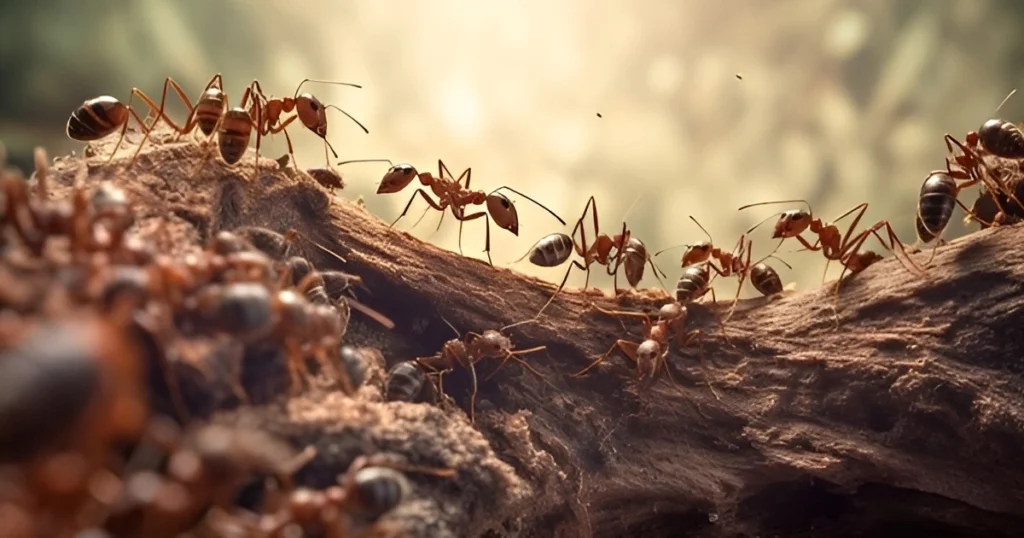
Boiling water is popular and affordable for getting rid of ants. But does it kill ants? Let's take a closer look at the effectiveness of boiling water against ants.
Boiling water poured directly on ants can immediately impact them, causing them to die almost instantly. This happens because the high temperature destroys the ants' exoskeleton and internal organs. However, it's important to note that the effectiveness of boiling water on ants depends on the size of the ant and the amount of water used. Larger ants may require more water to be completely killed.
While boiling water can effectively kill ants on contact, it may not be as effective in eliminating entire colonies. Ants live in large groups, and killing a few ants may not significantly impact the colony. Additionally, ants may be able to detect and avoid areas where boiling water has been used, making it difficult to eradicate them.
Overall, boiling water can be useful in controlling ant populations, but it may not be the best method for eliminating entire colonies. Using boiling water carefully and safely is important, as it causes burns or other injuries if not handled properly.
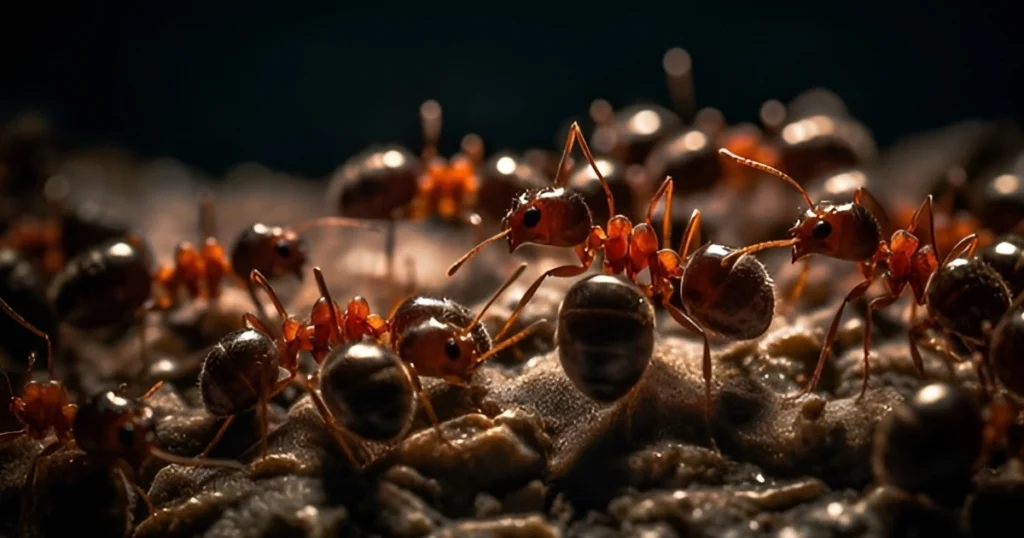
Ants are a common nuisance in many households and gardens. There are many ways to control their population, boiling water is a popular and effective method to kill ants. This section will discuss the application of boiling water to ant hills.
Boiling water is a simple and inexpensive method to kill ants. We must take proper precautions to avoid injury and damage to surrounding plants or structures. Here are some techniques and precautions to consider when using boiling water as pest control method:
Boiling water can kill ants by destroying their exoskeletons and drowning them. However, it can also impact the structure of the ant hill. When boiling water is poured over the ant hill, it can cause the soil to become compacted and hard, making it chellenging for plants to grow in the area.
In addition, boiling water can kill beneficial insects and microorganisms in the soil, harming the soil's overall health and surrounding plants.
In conclusion, boiling water can be an effective method of killing ants. However, proper precautions must be taken, and the impact on the ant hill structure and surrounding environment must be considered.
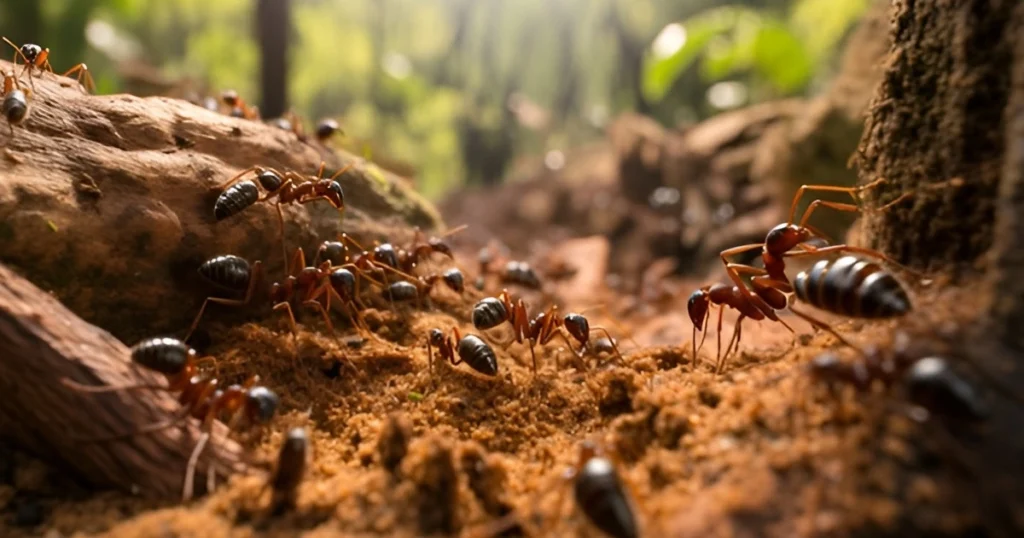
Boiling water can be useful in managing an ant infestation, but it is important to take proper safety precautions to avoid property damage or injuries. Here are a few things to keep in mind if you plan to use boiling water to kill ants:
While boiling water can be useful in managing an ant infestation, it is important to remember that it may not be effective in all situations. Make sure to seek the advice of a pest control expert to determine what to do for your specific situation.
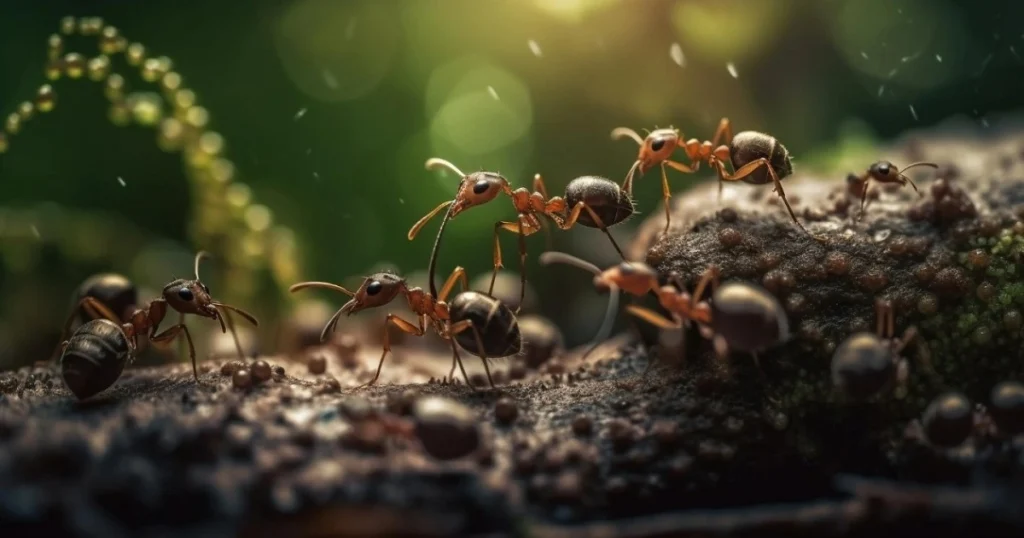
Using boiling water to kill ants can have positive and negative environmental impacts. On one hand, it is a natural and non-toxic pest control method that does not involve harmful chemicals. Boiling water is also readily available and inexpensive, making it a convenient option for homeowners.
However, there are some potential negative impacts to consider. Pouring boiling water directly onto ant hills can damage surrounding vegetation and soil and harm beneficial insects and microorganisms. In addition, boiling water can be dangerous to handle and may cause burns or other injuries if not used properly.
When using boiling water to control ant populations, it is important to take precautions to minimize environmental impact. This may include using a funnel to direct the water into the ant hill, avoiding pouring water onto plants or other sensitive areas, and wearing protective clothing and gloves to prevent injury.
It is also important to note that boiling water may not be effective against all types of ants. While it can be effective against some species, such as fire ants, others may be more resistant and require alternative control methods.
While boiling water can be useful for controlling ant populations, it should be used with care and consideration for the surrounding environment.
Boiling water is not the only way to control ants. Many natural and chemical alternatives are available. Some natural alternatives include diatomaceous earth, vinegar, and essential oils.
Diatomaceous earth is a natural powder that can be sprinkled around the ant's nest. It is a natural insecticide that kills ants by drying out their exoskeleton. Vinegar can also be used as a repellent to keep ants away from a specific area. Essential oils such as peppermint, tea tree, and cinnamon can also be repellents.
Chemical alternatives include ant baits, ant sprays, and ant dust. Ant baits are slow-acting poisons that ants carry back to their nests. Ant sprays and dust contain chemicals that kill ants on contact. It’s important to read the labels and keep with the instructions carefully when using chemical alternatives.
Prevention is crucial to controlling ants. Here are some preventative measures to prevent ants from entering your home:
Following these preventative measures will make ants less likely to enter your home.
In conclusion, boiling water is not the only way to control ants. Many natural and chemical alternatives are available on the market, as well as preventative measures that can be taken to prevent ants from entering your home.
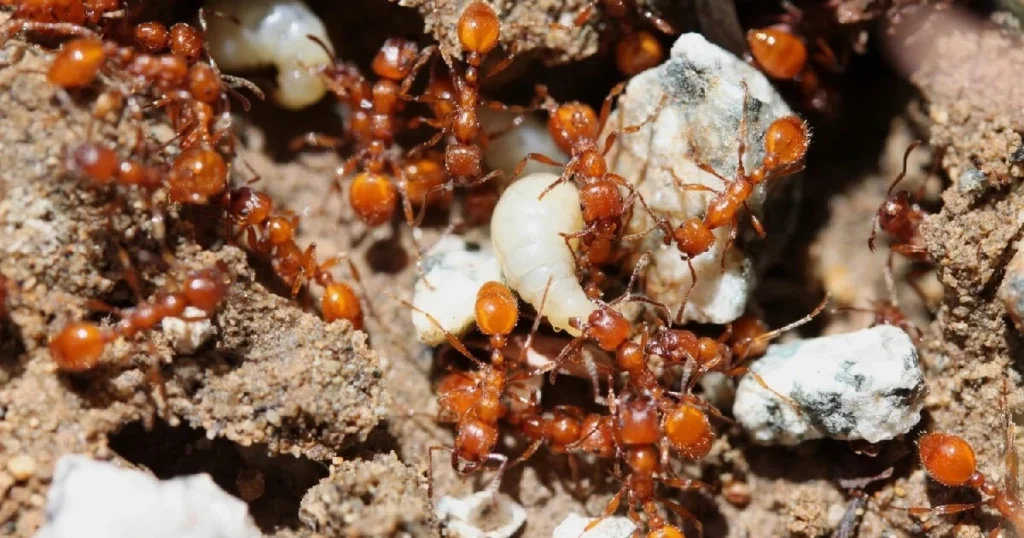
Fire ants are very aggressive and can cause painful stings. They are also notorious for their resilience and ability to adapt to new environments. Fire ants build nests in the ground, and the colonies can contain thousands of ants. Eliminating the entire colony with traditional methods like baiting or spraying is challenging.
Boiling water is a popular and inexpensive method for killing ants. It can also be considered an environmentally friendly option, as it does not involve using harmful chemicals. But will boiling water kill fire ants?
According to research, pouring boiling water over a fire ant colony can kill the ants. The heat from the water can destroy the ants' exoskeletons, causing them to die from dehydration. However, it is important to note that boiling water may not kill the entire colony, especially if it is large. Some ants may be able to escape the water and rebuild the colony elsewhere.
Taking safety precautions when using boiling water to kill ants is also important. Boiling water can cause serious burns, so it must be handled with care. You should wear protective clothing and pour the water from a safe distance using a long-handled pot or kettle.
In conclusion, boiling water can effectively kill fire ants but may not eliminate the entire colony. It is important to use caution and follow safety guidelines when using boiling water to kill ants.
Boiling water effectively kills ants, but it may not be the best solution for ant infestations. While boiling water can kill ants on contact, it does not address the root cause of the problem. Ants are social insects that live in large colonies, and killing a few ants with boiling water will not eliminate the entire colony.
To effectively control ant infestations, it is important to identify and eliminate the source of the problem. This may involve locating and sealing off entry points, removing food sources, and using bait traps or other insecticides.
Critter Stop, a professional humane wildlife removal company, can provide expert advice and assistance with ant infestations and other pest problems. With a fantastic reputation and great customer service, Critter Stop is the go-to solution for homeowners and businesses looking to eliminate pests from their property. Call Critter Stop at (214) 234-2616 for a free inspection and to learn more about their pest removal services.
Boiling water has been used to control ant infestations for a long time. There are many myths and misconceptions surrounding this pest control method. Here are some frequently asked questions and myths about using boiling water as an ant control:
One of the most common misconceptions about using boiling water to kill ants is that it will kill them instantly. While boiling water can kill ants, it may not be an immediate death. Ants have a hard exoskeleton that can protect them from the high temperatures of boiling water. So, the water may take some time to penetrate the exoskeleton and kill the ant.
Boiling water can effectively kill ants, but it may not kill the entire colony. Ant colonies can be quite large, and boiling water may only kill the ants directly in contact with the water. The ants not in contact with the water may survive and continue to build the colony.
Boiling water can effectively control ants, but it may not be safe to use around plants. It can damage and kill plants' roots. So, if you use boiling water as an ant control, be careful not to pour it on any plants.
Boiling water can control ants indoors, but it may not be the best method. Pouring boiling water indoors can be dangerous and cause burns or surface damage. Many other methods, such as bait stations or sprays, can also be used.
Boiling water can effectively eliminate an ant infestation, especially if the nest is located outdoors. However, it may not be effective for indoor infestations or if the ants have multiple nests.
Hot water can effectively control ant populations, but it may not eliminate the problem. It is best used with other methods, such as baiting or sealing entry points.
Boiling water can kill ant eggs, but it may not penetrate deep enough to reach eggs located further inside the nest. Some ant species may also have protective coatings on their eggs to prevent boiling water from penetrating.
Boiling water can effectively kill fire ants, but it may not eliminate the problem. Fire ants have a high tolerance for heat, so it may require multiple applications of boiling water to eradicate the colony.
Boiling water can effectively kill ants and destroy ant hills, but it may not eliminate the problem. Some ant species have multiple nests, so additional treatments may be required to eradicate the infestation fully.
Soapy water can be an effective alternative to boiling water in ant extermination. Soap can break down the waxy coating on ant exoskeletons, causing them to dehydrate and die. However, it may be less effective for larger infestations or ants with multiple nests.
The minimum temperature of water required to kill ants is around 120°F (49°C). However, it is recommended to use water that is at least 140°F (60°C) for best results.
Several natural alternatives to boiling water for ant control, such as diatomaceous earth, vinegar, and essential oils. These methods may not be as effective as boiling water, but they can be a safer and more environmentally friendly option.
Visit our Critter Library and learn more about our furry friends